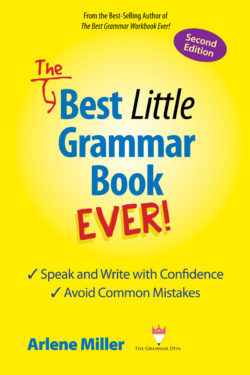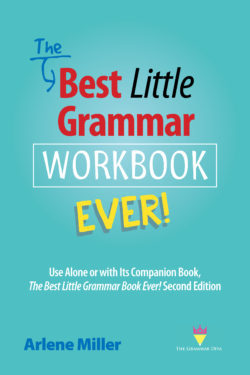Arlene Miller's Blog, page 48
November 16, 2016
Post-Election Word Wall Part 2
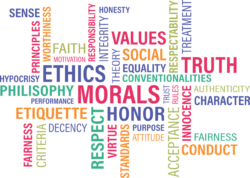 Last week’s post was the Post-Election Word Wall Part 1. Here is the concluding segment of the post-election word wall:
Last week’s post was the Post-Election Word Wall Part 1. Here is the concluding segment of the post-election word wall:
Best New Hyperboles – bigly (which may actually have been big league, but it aways sounded like bigly) and yuge. Oh, and we should probably add tremendous.
Most Discussed Body Part – Hands (Yes, I know . . . there were others!)
The Four B Words – Benghazi, Breitbart, Blind Trust, Bannon
The List of Insults (likely not a complete list):
Crooked Hillary
Little Marco
Lying Ted
Low-Energy Jeb
Pocahontas (Elizabeth Warren)
Miss Piggy (Ms. Machado, former Miss Universe)
Uniquely Unqualified
Favorite Twitter Words – wrong, bad, unfair, disaster (electoral college 2012), genius (electoral college 2016)
Words to Describe the Election: Corrupt, Rigged, “the people have spoken,” “accept it and move on,” WTF?
Post-Election Words:
fence (formerly known as wall?)
cabinet
transition team
popular vote
electoral college
deportation
fight!
petition
protest
hate crimes
Million Women’s March on Washington
2018
2020
Next week: No more politics. Back to grammar and such.(Glad to hear that??)
November 11, 2016
Post-Election Word Wall Part 1
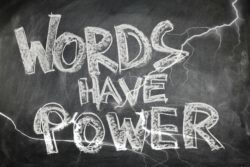 “I have words . . . I have the best words.” – Donald J. Trump
“I have words . . . I have the best words.” – Donald J. Trump
Words are part of everything, obviously, as they are our most common way to communicate. And every election certainly has slogans attached to it. However, the recent presidential election had new words, old words with new meanings, and new phrases, as well as the usual slogans.
This is not a partisan post, although most of the material will likely come from one particular side of the campaign. Additionally, most of you know where I stand politically, I would assume. However, let’s have some fun with this. Next week will be part 2, the concluding part of Post-Election Word Wall.
****
Most Important Word of the Campaign Award: E-Mail. It arose early and then was gone for most of us. “I don’t want to hear any more about Hillary’s damn e-mails.” It then reared its ugly head again a couple of weeks before the election. Two days before the election it was rolled back again . . .probably too late.
Election Phrase with the Most Imagery Award: “The Basket of Deplorables.” You can just about picture it. And the word deplorable was pluralized,, meaning it was turned from an adjective into a noun.
The Three P’s: Puppets (No puppet, no puppet; you’re the puppet), Putin (Do you know him or not??), and Pussy (not the cat)
The Three Abbreviations: KKK (where did they come from?), KGB (Hi, Putin!), FBI (oh, Comey)
Most Deplorable Chant: Lock her up, lock her up, lock her up . . .
Most Famous Place Award: Aleppo (“What’s that?” he asked.)
Common Word Erasers Award: Disavow, Walk back
New Words for Racism:
Rapists = Hispanics
Islamic Terrorists = Muslims
Beyonce, Jay Z ” and the like” = African Americans
Worst Choice to Pick a Fight With: Gold Star Family
Prom King and Queen: Bad Hombre and Nasty Woman
Who Has The Better of This New Presidential Qualification? Temperament
Best Alliterative Phrase Uttered by a Current President: Uniquely Unqualified
Best New Vocabulary Word to Impress Your Friends With: Misogyny
Slogans and Phrases of the Campaign:
Make America Great Again
Stronger Together
Love Trumps Hate
I’m with Her
God-Given Potential
Legal Term of the Campaign: Plagiarism
Most Common Google Search Phrase: “Moving from the U.S. to Canada”
AND
Most Common Phrase That Is Also a Pink Floyd Album: The Wall
Reviews!
Reviews seem to be an integral part of Amazon sales. My workbook sells very well and has over 50 reviews. I have a favor to ask: If you have any of my books and have not yet written an Amazon review, I would so appreciate it if you would. A review doesn’t have to be long. It can be just a sentence or two. Thank you so very much!
November 3, 2016
Synesthesia? What’s That?
 And now for something a little different . . .
And now for something a little different . . .
Ever since I was little — I guess ever since I knew letters and numbers — they each had a color when I pictured them. For example, S and 6 were always yellow, E green, 7 brown, L and O white with black outlining. And the days of the week had colors too: Tuesday was yellow, Wednesday green, Thursday purple, and Saturday, also yellow.
I never really thought anything of it; I assumed everyone saw the same thing.
Within the last year or so, I vaguely remember reading something about seeing numbers and letters as different colors. I don’t remember where I saw it, but I said to myself, “Oh, so it is a real thing and not everyone can see it.” And I quickly forgot about it.
A few weeks ago, I saw a book on the New Books rack at the local library. I am a book fanatic, and even though I have plenty of books on my shelves, I can’t go to the library without getting a book. It was a novel called Tuesday Nights in 1980. It is about an art critic with synesthesia. He sees and even smells things associated with paintings. The book contained some information about synesthesia in the introduction, and I then started to do some research. I don’t know any other synesthetes, so please let me know if you are one.
Synesthesia is a sort of crossing over of one sense into another. There are many different types. One of the more common forms is the type I have, known as grapheme-color synesthesia, where letters and/or numbers are perceived as colored. Although they always appear pretty much the same color to the same synesthete, the colors are not universal among different people. For example, I see 6 as yellow, but someone else might always see it as blue. However, studies have found that sometimes synesthetes see the same color for a letter or number; for example, A is usually red.
Generally, this “condition” lasts throughout someone’s lifetime. The colors I see seemed to have faded throughout the years, but many are still there. And not every number or letter has to have a color associated with it.
It is likely that synesthesia develops during childhood when children are learning abstract concepts for the first time. Grapheme-color synesthesia develops when children start to identify letters and numbers.
As with me, synesthetes are unaware their experiences are unusual until they realize other people don’t have them. Most synesthetes report that their experiences are pleasant or neutral, although, infrequently, people complain that their synesthesia leads to “sensory overload.”
Although it is labeled as a neurological condition, many of us consider our synesthesia as a gift rather than as a handicap. Synesthetes often use their special abilities to memorize things, do mental arithmetic, etc. Many of us are involved in creative activities.
Years ago (synesthesia was noticed as far back as the 1800s), it was thought that synesthesia occurred in maybe 1 in 20,000 people, but now it is thought that as many as 1 in 23 people may have some form of it. And there are many forms in addition to grapheme-color:
Tone → (color, movement) synesthesia: People see colors when they hear certain tones of music.
Spatial-sequence, or number form synesthesia: Numbers, months of the year, and/or days of the week appear in precise locations in space (for example, 1980 may be “farther away” than 1990 or 5 may be to the left of 2), or may appear as a three-dimensional map (clockwise or counterclockwise).
Chromesthesia: Everyday sounds such as doors opening, cars honking, or people talking can trigger seeing colors– 0r certain musical tones.
Auditory-tactile synesthesia: Certain sounds can produce sensations in parts of the body. A specific word might feel like a touch in a specific part of the body. This is one of the least common forms of synesthesia.
Ordinal-linguistic personification: Ordered sequences, such as numbers, days of the week, months of the year, or the alphabet are associated with personalities and/or genders. For example, the number 7 could be a teenage girl with an attitude, or the letter M might be little boy who is whining all the time.
Mirror-touch synesthesia: A rare form of synesthesia where individuals feel the same sensation that another person feels (such as touch).
Lexical-gustatory synesthesia: A rare form of synesthesia where certain tastes are experienced when hearing words. For example, the word automobile might taste like chocolate. I often felt that the number 4 smelled like paint, so I don’t know what that’s all about!
Spatio-temporal synesthesia: A mental map of days, weeks, and/or months, where people say that they can “see the time,”for example, as a ring or circle.
So what causes synesthesia? It is thought to be increased cross-talk between brain regions specializing in different functions. For example, the experience of seeing color when looking at numbers and letters might be due to cross-activation of the grapheme-recognition and the color areas of the brain.
A study found that synesthesia is found in 4.4% of the population, 1 in 23 people. According to that same study graphemes-color synesthesia if found in one percent of the population. There is also research to suggest that the likelihood of having synesthesia is greater in people with autism.
So what creative people whom you might know have synesthesia?
The artist Kandinsky
The author Nabokov
The artist David Hockney
The musician/composer Duke Ellington
The composer Rimsky-Korsakov
Musician Billy Joel
Violinist Itzhak Perlman
Mickey Hart of the Grateful Dead
Happy Pharrell Williams
Joanne Harris, author of Chocolat, who experiences colors as scents
I would love to hear from you if you are a synesthete. I believe there is a national organization for us – which I don’t belong to, since I just found out I am one!
Thanks Wikipedia for the information, and here is the link for more specific information.
…………………………………………………………..
TUESDAY IS ELECTION DAY. PLEASE VOTE!
October 27, 2016
The Curse of Cursive
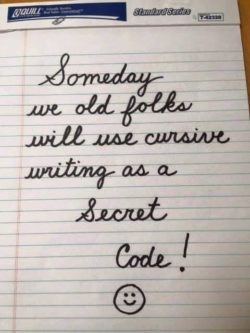 Cursive and the Educational Standards
Cursive and the Educational Standards
If you haven’t been in the field of education . . . there are educational standards—things that should be taught at the various grade levels. Currently, those standards are called Common Core, and they are national, although states have the right to not adopt them. Prior to that, states had their own standards. One thing is for certain: the standards change, or at least change in name every few years or so. I suspect it is because many people’s jobs are at stake: those who develop the standards.
Common Core is silent on cursive, but it prioritizes computer use and keyboarding skills because its tests are taken on computers. However, even beginning in the 1990s, cursive writing got less and less instructional time. Currently, at least 41 states do not require public schools to teach cursive reading or writing.
Since 2010, 45 states have adopted the Common Core standards, which do not require cursive instruction but leave it up to the individual states and districts to decide whether they want to teach it. So what are the pros and cons of cursive?
Pros and Cons of Teaching Cursive
The obvious “con” is that cursive is outdated. Computers have taken over, and most people use them to write. Otherwise, people can print. Who needs to learn cursive? It is not a “21st century skill.”
Here are some of the pros:
Experts have said cursive training helps small children develop hand-eye coordination, fine motor skills, and other brain and memory functions. Such skills could be important for children who might become surgeons, painters, or other occupations requiring laser-like precision with their hands.
Some teachers say that students like cursive writing because it is artistic and restful to practice.
A second grade teacher said that for some students being able to write like grown-ups is a rite of passage. And, she adds, “It promotes perseverance.”
Advocates for learning cursive argue that “more areas of the human brain are engaged when children use cursive handwriting than when they keyboard.”
An academic therapist said cursive writing helps students who have dyslexia. “Because all letters in cursive start on a base line, and because the pen moves fluidly from left to right, cursive is easier to learn for dyslexic students who have trouble forming words correctly.”
Some experts say that nice handwriting can lead to better grades in school. An education professor at Florida International University recently conducted a study that found that children with neater handwriting developed better reading and math skills than their chicken-scratch peers.
According to a 2006 College Board report, SAT essays written in cursive received a slightly higher score than those with block print. But only 15 percent of the essays were written in cursive.
And what about the time when a keyboard is not available (is there ever such a time????)? It is faster to take notes in cursive than by printing letters.
Some parents have been surprised at the lack of cursive training. Some are teaching it at home. Some schools are teaching it more as art than as a straight academic subject. So, in this case, cursive is a tradition, and, for some, a more personal way to communicate.
And then there are the arguments:
Cursive improves eye-hand coordination . . .But there are other ways to build good eye-hand coordination other than writing in cursive.
The Constitution is written in cursive . . . But you can certainly find printed versions of it to study!
You won’t be able to read Grandma’s letters . . . But Grandma’s letters probably aren’t even written in cursive any longer. She is probably using e-mail or Skype to communicate. (maybe)
An online poll by Harris Interactive showed 79 percent of adult respondents and 68 percent of kids ages 8-18 think cursive should still be taught. Nearly 49 percent of adults and 35 percent of youth say practicing reading and writing in cursive improves literacy. Okay, the survey was paid for by a pencil maker (really).
When asked what they assume about people who can’t read or write cursive, 30 percent of adults polled and 25 percent of children judged the person as less literate, and 7 percent of adults and 11 percent of children assumed they are “just not smart.”
Kids gave a couple of good reasons why cursive is important:
“It’s cool and fancy. It’s faster because you write all the letters together.”
“If you’re going to be a famous soccer player, you need a signature for autographs.”
A couple of problems arise with teaching cursive. (1) If people are not learning it, teachers will no longer be able to teach it. Already, newer teachers have less experience with cursive and teaching it. (2) With more and more to be taught, increasing technology, and more time taken for standardized testing, cursive is one of the easiest things to eliminate from the curriculum because it is deemed not necessary for today’s world. (3) Cursive needs to be taught, but it also needs to be used and practiced lest it be forgotten. In some school districts, it is taught in third grade and never touched again.
What Are the States Doing About It?
Arkansas, California, Florida, Georgia, Idaho, Indiana, Kansas, Massachusetts, North Carolina, South Carolina, Tennessee, Utah, and Virginia are now trying to keep cursive in the curriculum.
A few Washington, D.C. traditional public and charter schools offer cursive; most others don’t.
Bills have been introduced in state legislatures in North and South Carolina, Indiana, and Idaho mandating cursive instruction. (In some cases, the bills were supported by companies that sell writing materials.)
Catholic schools, long known for emphasizing penmanship, are still teaching it, but are devoting less time to it.
The Virginia Department of Education mandates that third-graders should be able to read and write legibly in cursive. However, it is not always taught.
Georgia has laws mandating cursive instruction.
Responding to parent complaints, some states are revising the national standards and adopting their own rules. Arkansas lawmakers made cursive writing instruction mandatory in the state’s public elementary schools beginning in the 2015-2016 school year.
Tennessee passed a similar bill last summer. The Florida Department of Education approved updates to Common Core last year, adding cursive writing as part of fourth- and fifth-grade standards.
What I Think
I was an English teacher in middle school until 2015. Cursive was on the way out, and my entire department was very pro-cursive. We could teach it, students could use it . . . however, we were no longer permitted to require it.
Now I wonder about its actual value, apart from it being part of our writing tradition,an additional skill (it is faster than printing), and an art. I notice that many of the states (not California and Massachusetts) that are trying to bring back cursive are conservative states, states where traditional values are important. I don’t fit in with these beliefs generally. I am all for progress. But maybe cursive isn’t exactly the same as a progressive political agenda. I just somehow wonder when I see the states that are trying to keep cursive in the curriculum. Are they just trying to keep the “good ole days” around? I haven’t come to a conclusion about that. But here is what I do believe:
Printing is the first type of writing children learn. It is important. Keyboarding is also important in this world: actually it is crucial. Cursive is good for brain development and coordination; it is also faster than printing and it looks lovely if done right.
Back when I went to school, we learned to print. Then, in second grade, we learned cursive, which we kept learning and using all the way through high school. I never took typing in high school (I did teach myself), but lots of students did. So they learned all three modes of written communication. Why can’t kids do that now? Too few days of school? Too much time taken up for disciplining unruly students? Too much time taken for standardized testing? Fundraisers?
Someone has said, “In the 21st century, you teach kids to be multilingual by hand.” I agree.
Thank you to the following websites for helping me put this piece together.
http://www.usatoday.com/story/news/na...
http://www.eonline.com/news/481596/cu...
https://www.washingtonpost.com/local/...
http://www.today.com/parents/cursive-...
http://www.csmonitor.com/USA/Latest-N...
Grammar Diva News
My newest book, The Best Little Grammar Workbook Ever! is now available on Amazon, all other online retailers, Kindle, and soon all other e-readers.
My next book, The Best Little Dictionary of Confused Words and Malapropisms, will be out within the next two or so months.
I will be participating in NaNoWriMo this November (National Novel Writing Month), writing a sequel to my first novel. Yup, I do have a novel for those of you who didn’t know I tried writing fiction! I am going to change the title and author of my fiction book, getting rid of my pseudonym and making the book the first in a series. Here it is on Amazon. The new title will be Trashy Novel Book One: Four College Girls and a Purple Boa. The one I am about to begin will be the first sequel, Trashy Novel Book Two: Cybil. I have an undeveloped Facebook page for my novels, and will probably develop a new website for novels. My pseudonym, JoJoBaker, will be changed to A. Miller.
As Grammar Diva, once again, I will be participating in the first annual West Sonoma Book Faire at the Sebastopol Grange on Thursday, November 10, from 6 to 9 p.m. Free to the public.
I will also be participating in the Writer’s World Vendor Faire, sponsored by the Bay Area Independent Publishers Association at the Next Key Center in Novato on Saturday, November 12, from noon to 3 p.m. Free to the public.
October 14, 2016
Malaprop . . . What???
 The word is malapropism: the unintentional use of an incorrect word, often ridiculously, and usually confusing words that sound similar. For example, The company lost money this physical year instead of the correct term, fiscal year.
The word is malapropism: the unintentional use of an incorrect word, often ridiculously, and usually confusing words that sound similar. For example, The company lost money this physical year instead of the correct term, fiscal year.
The book I am currently writing is titled, The Best Little Dictionary of Confused Words and Malapropisms. With any luck at all, it will be out at the end of 2016 and will contain all those commonly confused words (affect/effect, soul/sole, lose/loose, etc. ) as well as common malapropisms, some of which are phrases.
The word malapropism (mal being the prefix that means “bad” or “wrong”) comes from a character named Mrs. Malaprop in Richard Brinsley Sheridan’s 1775 play The Rivals. Mrs. Malaprop frequently uses words that don’t have the meaning that she intends, but sound similar to words that do. Sheridan chose her name in reference to the word malapropos, derived from the French phrase mal à propos (“poorly placed”).
Here are just a few common malapropisms:
I am on tender hooks – Should actually be on tenterhooks . A tenter is the frame thaat cloth is stretched out on when it is being made. The tenterhooks are the hooks or bent nails that hold the cloth. The idiom means to be held in suspense.
I am not at your beckon call – Should actually be beck and call . The difference between beckon and beck appears to be simply the part of speech. Beckon is a verb (to signal someone to come to you). Beck is the gesture you use to summon someone. In the idiom, beck and call are both nouns.
He is the spitting image of his sister – Should be spit and image. Again, it might be a matter of part of speech. Spitting is an adjective. Spit is a noun. But I don’t know what spit has to do with this idiom anyway!
The comedian was self-depreciating – No. The comedian was self-deprecating , which means the comedian made jokes about himself or herself. To depreciate is to lose value over time, like computer equipment.
For all intensive purposes , we are already married – Should be intents and purposes. An intent is the same as an intention or purpose. Intensive means having a high degree of intensity.
I love to read, pacifically romance novels – Has nothing to do with oceans. It should, of course, be specifically .
Chester Drawers does not live in your bedroom and hold your underwear – it is a chest of drawers , or a bureau.
When you blame someone for something, there are no goats escaping – it is scapegoat , not escape goat.
Although it feels like a pain when you are really hungry, the term is hunger pangs , not hunger pains.
If a dog is walking behind you, you might get nipped in the butt . However, if you stop something in time, you have nipped it in the bud , or beginning stages.
Yes, there are children and teenagers in Asia, but mercy killing is called euthanasia, not youth in Asia.
Survival of the fittest may make this a dog-eat-dog world – it isn’t however, a doggy dog world .
The Best Little Dictionary of Confused Words and Malapropisms will have these and many more malapropisms – as well as tons of confused words. Watch for it — later this year.
October 10, 2016
Who Goes to Book Festivals, Anyway?
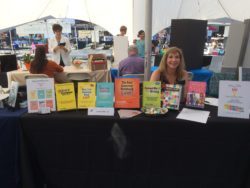 Books. Wonderful things, they are! Most people seem to like books. Some people are happy now that they can carry thousands of books around in a single electronic device – or even read on their phones (which isn’t so bad at all – I have read books on my phone). Other people just like the feel and smell of a real book with pages that turn. Some people like to collect them and show them on walls full of shelves.
Books. Wonderful things, they are! Most people seem to like books. Some people are happy now that they can carry thousands of books around in a single electronic device – or even read on their phones (which isn’t so bad at all – I have read books on my phone). Other people just like the feel and smell of a real book with pages that turn. Some people like to collect them and show them on walls full of shelves.
Some people gravitate toward bestsellers. Others like classics, and others like collecting rare books and first editions. Books are great because there are books for every age and interest: how-to, history, science, mystery, thriller, romance, fantasy (and grammar, of course!) . . .
And now that publishing one’s own book is easy, there are so many books and so many authors to choose from! Now, local, unknown, self-published authors put out fabulous books – just like more famous authors.
Although the number of big New York publishers has dwindled, self-publishing (with the help of Amazon) is flourishing, so publishing has changed, but is still big business.
Book events of various types abound. There are big publishing shows like Book Expo in New York City, and the huge annual show in Frankfurt, Germany. These are trade shows for publishers (and authors), where it is expensive to set up a booth and expensive to attend.
Then, we have writer’s conferences, different from book trade shows. Every year San Francisco has a big one. Although there are some vendors (I was one once), writer’s conferences generally invite authors of various genres – as well as people in various aspects of publishing – to speak. So these conferences are more about craft than a book expo, which is more of a publishing trade show.
Author events are popping up everywhere, mostly at bookstores, where both famous and not-so-well-known authors appear to sell and sign their books, and often to speak. Often these are book “launches,” meaning the rollout of a new book. I have done several of these at my favorite local bookstore. Famous authors can draw hundreds of people, sometimes requiring a larger venue to be found by the bookstore. On the other hand, local and unknown authors can sometimes stand behind a table at a signing and – sit there alone. It has happened to lots of authors!
Another type of book event is the book festival or book fair. These are really like street fairs and are generally held outside – sometimes downtown somewhere, sometimes at a shopping mall. My home, Sonoma County, used to have one, but it has gone away; no one wanted to run it any longer. And authors often complained they didn’t sell any, or many books, at this type of event.
I was invited to the Great Valley Bookfest in Manteca (CA) last weekend. Despite the two-hour drive each way, it was fun. It was well-run; there were lots of authors selling books, many of whom also made presentations; there was food; and it was held at a mall right next door to the Spirit of Halloween store.
There was plenty of foot traffic at the Bookfest. And it appeared that there were books being sold. I sold a decent number of books, although of course I wish I had sold a whole lot more! Who wants to carry the books back home again!
Who goes to an event like this? Well, it was a hot, sunny Saturday morning and afternoon, a good day to get out. Were people there because they wanted to go to a book festival or because they were going to the mall anyway – maybe to buy a Halloween costume? The event was well- enough publicized so that people heard about the festival, so I think many people were drawn to come out for the books. People like to look at books and chat with authors. Some even like to buy a book that is signed by the author. Then there were the used books for sale by the library – and free at the end of the day.
But I always wonder: Sure, people might buy a fantasy book, or a kid’s book, or a cookbook at a book festival. But who is going to buy a grammar book at a book festival? Many of the people who stopped by my table were teachers or ex-teachers, quite understandably. I don’t know if this is true, but I think if people want a grammar book, they will buy it on Amazon where no one can see what they are buying. Grammar books just don’t seem like an exciting thing to buy at a book festival — where you are admitting perhaps that you need it. But maybe that is just my assumption – and possibly quite an incorrect one, since I think I sell pretty well at these things compared to other authors. And do people want to buy a book by an unknown author? Is it a gamble? The books by us “unknowns” are no less expensive, nor should they be, unless they are of a lesser quality – which most of them are not. Yes, sometimes there are some name authors at these events, but mostly not.
The most disappointing part of the day was my presentation. There were lots of 30-minute presentations, several going on at once. I thought a lot about what I would talk about. And then, no audience! OK, a couple of the festival volunteers managed to drag a couple of people over to hear me. Grammar is often not a real crowd attraction. If only they knew how funny and entertaining it can be . . .
So, I don’t know who goes to book festivals. I would think it’s a little bit of everyone: book lovers, book collectors, people who happen to be wherever it is being held anyway, people who like to stroll around street fairs, and parents looking for books for their children.
In any case, I had fun and met some nice people.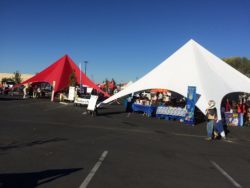
October 6, 2016
There Is a House in New Orleans . . .
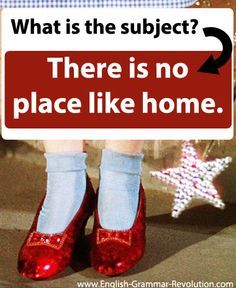 . . .they call the rising sun. . .
. . .they call the rising sun. . .
Do you remember ever being taught not to start a sentence with “There is . . .”? You may have been, because it just isn’t a very good way to begin a sentence. It is called an expletive construction.
Why isn’t “There is” or “There are” (or even “It is . . .”) a good way to begin a sentence?
Weak
Wordy
Sometimes difficult to know whether to use a singular or plural verb
Weak:
There is no need to read the entire article. Weak
You do not need to read the entire article. Stronger
Redundant:
There are many people who love the color blue. Wordy
Many people love the color blue. Concise
Confusing. Singular or Plural?
There are a bunch of bananas on the table?
There is a bunch of bananas on the tab?
The subject is bunch, not bananas, so it is singular:
A bunch of bananas is on the table
There is a bunch of bananas on the table.
Generally, we think of the subject as being the first word in a sentence, and it often is. Subjects are either nouns or pronouns:
Jake took the rest of the cake home. (noun subject)
He took the rest of the cake home. (pronoun subject)
But we often (correctly) put something before the noun or pronoun: a word, a phrase, sometimes an entire clause:
Finally, Jake took the rest of the cake home. (a word)
After the party, Jake took the rest of the cake home. (phrase)
Because I didn’t want to eat it, Jake took the rest of the cake home. (clause)
All of the above sentences are fine. The subject doesn’t have to come first in a sentence. But “there” is a weird way to begin a sentence. It is not a noun, it is not a pronoun, and it is not a connecting word. While it may look like it is the subject, it isn’t. The subject would be somewhere after the verb in this type of construction.
There is a house in New Orleans . . .
A house is there in New Orleans. House is the subject.
There is a fly in the ointment.
A fly is there in the ointment. Fly is the subject.
There’s a bad moon on the rise.
A bad moon is on the rise. Moon is the subject.
There is a sucker born every day.
A sucker is born every day there. Sucker is the subject.
It is truly best not to begin a sentence with There is. Usually. Here are some more examples:
There is a pot of coffee already made. (weak)/A pot of coffee is ready and waiting for you.(better)
There isn’t a cloud in the sky. (weak)/ The sky is cloudless. (better)
There is a spider on the wall. (weak)/ A spider is crawling up the wall. (better)
There is a meeting you need to attend. (weak)/ You need to attend the meeting. (better)
There is no telling what he will do next. (weak)/ What he will do next is a mystery! (better)
There is a pencil and a pad of paper on the table. (Weak and grammatically incorrect)/A pencil and a pad of paper are on the table.
And isn’t “The sun is shining” stronger than “It is a nice day”?
Isn’t “It has been brought to my attention that you are stealing,” too wordy when you can just say,” I heard you are stealing”?
If you were told to avoid writing sentences that start with “There is . . .” or “Here is . . .” or “It is . . .” you got good advice! Of course, when we talk we often say what comes into our minds first. We say it, and it is gone. Writing is a bit different. You can plan it, and you can change it later. And you can avoid beginning your sentences with “There is . . .”
September 30, 2016
A Day at School
This is the final of three posts using words that have new meanings with the advent of technology:
A Day at School
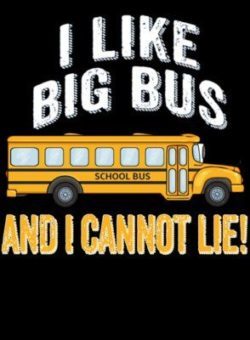 Every day I walk down the path that leads me to the train platform, where I catch my ride to school. There is a history of violence in my neighborhood school, thus the long ride everyday to school. I guess the long rides to school and then home again do give me time to decompress.
Every day I walk down the path that leads me to the train platform, where I catch my ride to school. There is a history of violence in my neighborhood school, thus the long ride everyday to school. I guess the long rides to school and then home again do give me time to decompress.
On the way to school I like to read — a real book. I love my special bookmark, which my grandma gave me and has a special poem on it. I also have an attachment to turning real pages. Right now I am reading a book about the Trojan Horse.
One problem about having such a long ride to school, though, is how early I need to get up! I like to open the bedroom window really early when I am just waking up to hear the tweets of the birds in spring and summer. And once in a while I can see a spider building a web right on my window!
When I get to school, I check in with the yard duty person, who walks around with a clipboard containing all our names. Minutes later we get the command to line up. My so-called friend, Greg, is usually right behind me, asking me if he can borrow my homework so he can copy it. He is such a user.
Once I get to my first class, I lay all my books out on the desktop. I take my tablet of paper out of my backpack and dig out this widget that is a fancy pen, but looks more like a garden tool! We all get up to get our folders where we keep the agenda for the day.
According to the agenda, we are going to begin history class with a reading from an original document. It looks as if it was written on a scroll, and the syntax is really difficult to figure out! It is also written in a script that is hard to read. Some kids don’t seem to be paying much attention today. Joanne, who sits next to me, has a hacking cough. Beth, who sits in back of her, is pulling threads out of her uniform blouse. Cathy, who sits in front of me, seems to be finishing her art project with some paper and paste.
After the first class, we have a break. I will go check my inbox to see if I have any papers to bring home. Then, my friends Joel and Jasper and I will link arms and march to our next class!
———-
Remember when a path usually involved some dirt or grass?
And a platform was something you could see and really stand on?
Decompressing would make you feel calmer?
A bookmark was made of heavy paper and could fall out of your book?
An attachment often involved feelings?
A Trojan Horse wasn’t something that crashed your computer?
A clipboard was sturdy and something you carried around?
A command could be heard? Often loudly?
Kids had to actually put some effort in copying your homework?
Users were people who took advantage of your generosity?
A desktop was a place to put your coffee and enjoy the mess of papers?
A tablet was something you wrote on — or swallowed with a glass of water?
A widget was something someone invented and made a lot of money from? Even if you didn’t know what the heck it was?
Folders were those impossibly messy things full of papers in your two-drawer file cabinet?
History was something you might not want to repeat — and not a list of websites you have visited?
A document could give you a paper cut?
A scroll could be unrolled and read?
Syntax was something you learned in English class?
A script had lines you memorized?
Hacking was done by someone with a cough — not Russia or China or a 400-pound man sitting on a bed.
Threads were something you wore?
Paste was sticky? And some kids ate it?
An inbox was stuffed with papers you would throw away rather than messages you could simply delete.
Links were not things you pressed on to go somewhere else?
*******************************************************
Now on Amazon! These books can be used together. However, each one can easily stand by itself. Both books have the same table of contents. The new workbook contains exercises and tests along with explanations and examples. The workbook is not yet available as an e-book, and is right now just available on Amazon. It will be available for order everywhere in a week or two. Buy the book on Amazon. Buy the workbook on Amazon. (Reviews are always appreciated! Thank you!)
September 23, 2016
National Punctuation Day!?.,:;”
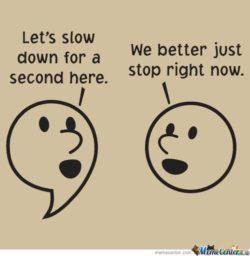 National Punctuation Day
National Punctuation DaySeptember 24th
September 24 is National Punctuation Day so I thought I would write this weeks post using no punctuation just to prove how important punctuation is the primary purpose of punctuation is to make writing clearer by showing us where we stop where we pause where we are asking a question and where we are exclaiming something and of course when we are directly quoting someone punctuation has been in the news lately because of texting common thought is that a period at the end of a text changes the tone of the text to one that is less friendly than probably intended I just decided to eliminate capital letters to begin sentences in this blog post because if there is no period there is no capital letter required of course I am keeping the capital I in the pronoun I because well that is just the way it is done I personally like punctuation especially the semicolon which many people dont like to use because maybe they are uncomfortable using it it really isnt very confusing and has far fewer rules than lets say commas which have about a zillion rules the main rule of using commas is to always have a reason to use one this can be a little complicated because the final rule of commas is to use one wherever not using one would cause confusion so I guess that one is pretty much up to the writer
one of the longstanding controversies about commas is whether or not to use one after the last item in a series of three or more that comma usage is called the Oxford comma its use has been bandied about for years and goes in and out of style I don’t know if it is currently in or out but I always use it it often clears up confusion such as in the sentence I am not voting for Jill Stein the doctor and the Green Party candidate is that a good example well it will have to do for now it will be difficult to understand since there is no punctuation here at all anyway
I hope we all appreciate the importance of punctuation for example the elimination of a single comma can be fatal as in the case of lets eat grandma and don’t worry even though I burned the roast we will eat my children
many people are really fond of a particular punctuation mark for me as I said it is the semicolon which is difficult to overuse however people do overuse punctuation marks such as the exclamation point and the dash many writers just love to use the long dash over and over again and the same is true of the exclamation point which should be used very sparingly and never twice in a row additionally please don’t end a sentence with a question mark and an exclamation point you will have to choose one or the other
I have read this blog post over and i actually didn’t have much trouble figuring out what it said but maybe that is because I wrote it in that case maybe punctuation isnt as important as we think it is maybe we should just eliminate it and while we are at it perhaps we should eliminate all vowels as well because it seems that people have no trouble reading something when all the vowels are lmntd
could you read that last word in the previous paragraph the one where the vowels have been lmntd well that is about all I have to say about punctuation for now so you can decide whether or not you want to use it any longer I would advise that you continue to use it just in case
Happy National Punctuation Day!!!!!!!!!
Coming soon to Amazon and all other online retailers in paperback! (e-book coming too!)
September 16, 2016
Probly Mischeevious!
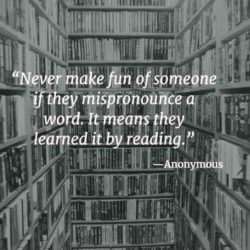 As you can see, the two words in the title of this post are misspelled. I intentionally (of course) misspelled them because that is the way they are usually (mis)pronounced. This post is about some commonly mispronounced words.
As you can see, the two words in the title of this post are misspelled. I intentionally (of course) misspelled them because that is the way they are usually (mis)pronounced. This post is about some commonly mispronounced words.
The word that bothers me the most when mispronounced has to be mischievous. I think just about all my 7th grade students pronounced it incorrectly, but then so does almost everyone else. In fact, my students told me I was wrong when I told them the correct pronunciation of this word. They insisted that it is pronounced mischeevious, with the accent on the middle syllable (wrong) and the i stuck in the last syllable (wrong). Look at the ending of the word, spelled correctly. It is -vous. The final -ous is pronounced -us: famous, glamorous, humorous –– you get the idea. Same with mischievous. It is pronounced the same as mischief, with the accent on the first syllable. Just turn the f into a v and add -us. Some people don’t even turn the f all the way into a v when they pronounce it.
Now that we have that all cleared up, here are some other commonly mispronounced words:
Probably is usually pronounced as a two-syllable word (prob-ly), when it actually has three syllables. Try to leave the middle syllable there.
I often hear often pronounced with the t. The preferred pronunciation is with a silent t.
Across has no t at all, silent or otherwise. It isn’t acrost.
Height doesn’t end with a -th. I don’t know where heighth came from, but I never heard anyone say weighth!
Jewelry is another tricky one. It isn’t jew-lery (separation of church and accessories!); it is jewel-ry, with the jewel generally pronounced more like jule.
Selling your house? You might contact a real-tor, not a re-la-tor. Two syllables only.
Here’s a good one. You pronounce something, but when pronounce turns from a verb into a noun, we lose the second -o. It is pronunciation, not pronounciation.
And you want to order a pre-scription, not a per-scription.
Of course, there are the old standby mispronunciations: liberry and Febuary — instead of library and February.
Grammar Diva News:
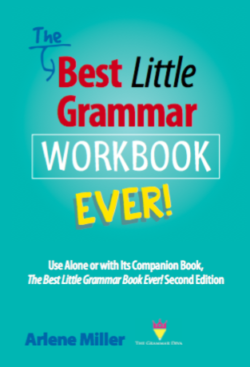 Within a couple of weeks, The Best Little Grammar Workbook Ever! will be available. If you would like a PDF copy of the book (just for you and not to share) so that you can review it on Amazon when it is brand new, contact me at info@bigwords101.com. I still have a few more PDF copies to give.
Within a couple of weeks, The Best Little Grammar Workbook Ever! will be available. If you would like a PDF copy of the book (just for you and not to share) so that you can review it on Amazon when it is brand new, contact me at info@bigwords101.com. I still have a few more PDF copies to give.
And if you live anywhere near Manteca, you will want to check out the BookFest. It is on Saturday, October 8. I will be on Authors Alley and will be giving a presentation at noon.


